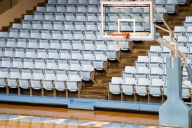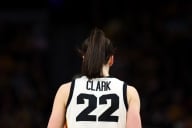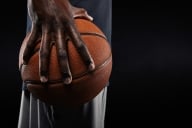You have /5 articles left.
Sign up for a free account or log in.
A much-awaited trial of an antitrust lawsuit challenging the National Collegiate Athletic Association's policies limiting players' rights to be compensated for commercial use of their likenesses got under way in a California courtroom Monday, with witnesses for the athletes painting the NCAA as a cartel and the association announcing a settlement in a related lawsuit that could result in some payments to current athletes.
O'Bannon v. National Collegiate Athletic Association, which had its first full day of testimony Monday, represents one of several legal challenges that target specific NCAA policies and practices but, at their core, take aim in one way or another at the amateurism model that underpins college athletics. The O'Bannon case, named for the lead plaintiff, the former University of California at Los Angeles basketball star Ed O'Bannon (you can read primers on the case here, here, and here), alleges that the NCAA (through its member conferences) operates a cartel that bars athletes from benefiting financially from the use of their names and images in television broadcasts, archival game footage and video games.
- Antitrust lawsuits could force much-needed change in college sports -- but Congress should step in instead, write Matt Mitten and Steve Ross. Read more.
- A year after predicting that big-time college sports is invulnerable to legal challenges, Murray Sperber changes his mind. Read more.
The day began with news of a settlement, but not in the case at hand. The NCAA announced that it had settled a lawsuit in which another former athlete, Sam Keller, had challenged the NCAA-sanctioned use of players' likenesses in video games produced by a company known as Electronic Arts. Keller's lawsuit had been separated from the O'Bannon suit and was scheduled to go to trial in March.
Under Monday's settlement, which the association said would make "further litigation in Keller and a trial unnecessary," the NCAA agreed to make $20 million available to Division I football and men's basketball players at certain colleges whose teams were included in the EA Sports games. The NCAA's statement acknowledged that some of the money could flow to some current as well as former athletes, and that the association would permit that even though such funds would normally result in a loss of athletic eligibility.
"In no event do we consider this settlement pay for athletics performance," Donald Remy, the association's general counsel, said in the news release.
Because the Keller case had been separated from the O'Bannon lawsuit, the settlement is unlikely to have any direct impact on the trial that began Monday. (Last week EA Sports and a sports licensing company agreed to pay $40 million to former athletes to settle claims that O'Bannon had made against them.) But it could have numerous indirect effects, including (because of confidentiality clauses) limiting the flow of information about EA Sports's arrangements with the NCAA, which might have benefited O'Bannon's legal team.
The O'Bannon lawsuit itself kicked right into high gear on Monday, with testimony from O'Bannon in which the former star player made the case that athletics thoroughly trumped academics during his college career ("I was there to play basketball"), and that he had little understanding of the many eligibility forms he signed as a 17-year-old entering college athlete, including the one in which he signed away his rights to control his image.
Under NCAA cross examination, O'Bannon conceded that the UCLA education he received in exchange for playing basketball there remains very valuable to him, that he could have taken better advantage of his educational opportunities than he did, and that a student who performs theater or music 40 hours a week is "regular student," though he said he considered himself not to be.
The other witness Monday -- arguably the most significant the athlete plaintiffs will present -- was Roger Noll, a sports economist whose arguments that the NCAA is a monopoly is a foundation of the players' case. Noll sought to make the case that the NCAA and its member colleges conspire to limit what athletes receive in scholarships and their rights to control their images and likenesses. He faced some skeptical questions from Judge Claudia Wilken, but his testimony -- and cross examination -- will continue today.









